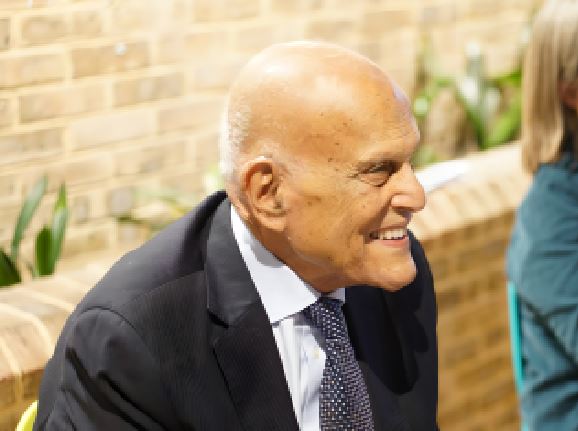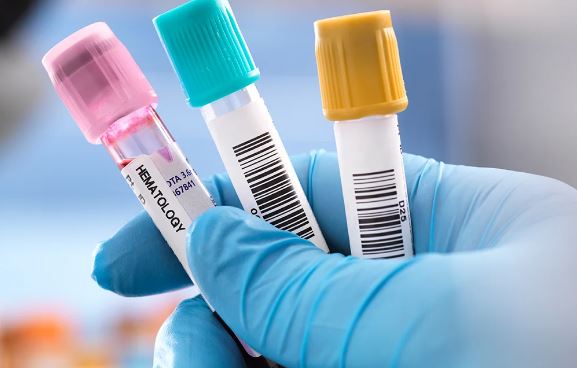Part of Guy's and St Thomas' NHS Foundation Trust

Connect
The newsletter for Trust members with an interest in heart and lung care
November/December 2023
NHS staff spread Christmas joy to Londoners in hospital
Festive magic is being brought to patients’ bedsides this Christmas time with thousands of free gifts and meals at Guy’s and St Thomas’ NHS Foundation Trust.
On Christmas Day over 2,000 beautifully wrapped presents will be delivered to inpatients at Guy’s, St Thomas’, Royal Brompton, Harefield, and Evelina London Children’s hospitals. To help spread the Christmas cheer even further, all patients receiving a community visit will also be given a gift.
Every patient will also enjoy a choice of festive themed feasts. NHS staff working tirelessly on Christmas Day will receive free meals, and staff working in the community will receive a free buffet box.
This has all been made possible thanks to support from Guy’s & St Thomas’ Charity, Evelina London Children’s Charity, Royal Brompton and Harefield Hospitals Charity and the Brompton Fountain.
Across the Christmas period, including Christmas Day, the catering teams will have prepared over 3,500 festive meals for NHS teams and patients to tuck into. This includes over 2,000 servings of roast turkey and stuffing, 600 servings of vegan chestnut Christmas pie and over 2,000 portions of Christmas pudding. This amounted to:
608 kg of turkey (equivalent to the weight of 40 Christmas trees)
400 kg roast potatoes (equivalent to the weight of an adult donkey)
800 litres of gravy (equivalent to the volume of over 1,500 snowballs)
Planning for this traditional feast and all the trimmings begins in August so that everything can be ready in time. Chef Ned (Nedko Rusev), has been trialling his Christmas starters since November, and Chef Luisa Baptista, who has worked at the Trust for an amazing 53 years, has been perfecting her delicious stuffing recipe year after year. 60 generous volunteers also supported the retail catering team in serving festive lunches to staff across 3 days.
Read more here.

Transplant pioneer tells story behind a medical milestone
The story behind a world famous medical milestone has been revealed in a new interview by Professor Sir Magdi Yacoub, on the 40th anniversary of the operation that made his name.
In a new podcast, the pioneer of heart and lung surgery has told of his struggle to conduct lifesaving transplants and establish a new unit at Harefield Hospital.
The podcast, available on Acast and Spotify, was published today, 6 December 2023, exactly 40 years after Sir Magdi carried out Europe’s first ever combined heart and lungs transplant at the hospital, having never previously conducted such an operation.
In the interview, Sir Magdi said transplant work at the time was portrayed as a “dreadful, unethical operation which is experimental and the patients are not going to survive for more than a year or two and it was just for experimentation.”
He was accused of carrying out over-ambitious operations in order to make himself famous.
Political leaders in the late 1970s and early 1980s also believed Harefield was a “village hospital” unsuited to such major operations and declared that transplants were not a “viable” operation deserving of public money.
At one stage, Harefield village itself started raising money for patients at its hospital. Government inspectors were also sent to assess the hospital but declared the unit one of the best they had seen.
Listen to the podcast: More Than A Hospital, and read more here.
https://www.rbht.nhs.uk/news/transplant-pioneer-tells-story-behind-medical-milestone
Exploring disability through the eyes of youth
Disability History Month is an annual campaign that puts disability at the forefront. It places the spotlight on disabled people and the importance of improving inclusion within society.
Inspired by the 2023 campaign theme of ‘disability, children and youth’, the Disability and Wellness Network (DAWN) at Royal Brompton and Harefield hospitals joined forces with two local schools (Harefield School in Harefield and Queen’s Gate School in Chelsea) to produce artwork under the theme of ‘disability, heart and lungs’.
The aim of the project was to enable young people to express their creativity and explore disability, diversity and inclusion through art – with the hope that they learn, and positively impact on the experience of patients, families and staff at the hospitals, where their final pieces are to be displayed.
Ras Kahai, respiratory dietitian and co-chair of DAWN, explained the thought process behind the project: “I had a memory of when I was a child about getting involved in an art project for our local hospital. 20 years later, the artwork is still up there to this day. So, I suddenly thought, ‘is that a way we could spread and scale a little about disability knowledge and disability education to our local communities and get them involved with our hospitals?’”
Watch the video and read more here.
Exploring disability through the eyes of youth
Disability History Month is an annual campaign that puts disability at the forefront. It places the spotlight on disabled people and the importance of improving inclusion within society.
Inspired by the 2023 campaign theme of ‘disability, children and youth’, the Disability and Wellness Network (DAWN) at Royal Brompton and Harefield hospitals joined forces with two local schools (Harefield School in Harefield and Queen’s Gate School in Chelsea) to produce artwork under the theme of ‘disability, heart and lungs’.
The aim of the project was to enable young people to express their creativity and explore disability, diversity and inclusion through art – with the hope that they learn, and positively impact on the experience of patients, families and staff at the hospitals, where their final pieces are to be displayed.
Ras Kahai, respiratory dietitian and co-chair of DAWN, explained the thought process behind the project: “I had a memory of when I was a child about getting involved in an art project for our local hospital. 20 years later, the artwork is still up there to this day. So, I suddenly thought, ‘is that a way we could spread and scale a little about disability knowledge and disability education to our local communities and get them involved with our hospitals?’”
Watch the video and read more here.

Revolutionary blood test for sepsis set to be trialled in UK-first
A new rapid blood test that could diagnose and monitor patients who are at risk of sepsis is being trialled for the first time at Guy’s and St Thomas’.
Sepsis, also known as ‘blood poisoning’, is hard to identify and there is currently no test to diagnose it. Without prompt treatment, it can lead to multiple organ failure and death. Every year in the UK there are 48,000 sepsis-related deaths, according to the UK Sepsis Trust.
The non-invasive and low-cost test being trialled for the first time in the UK uses patient blood samples to identify high levels of DNA fragments associated with sepsis within just 45 minutes. It could be used to screen patients for sepsis when they present with symptoms in the emergency department (A&E), or if their condition deteriorates on a hospital ward.
Early results suggest the test is able to identify patients who may be at higher risk of developing sepsis and progressing to organ failure. If the trial is successful, the test will help clinicians to identify the sickest patients more quickly and respond faster to prevent a patient getting sicker.
Sepsis occurs when the immune system, the body’s defence mechanism to infection, goes into overdrive. Immune cells, known as neutrophils, release an excessive number of spider-like-webs of DNA in an attempt to trap infections and prevent them spreading further – potentially leading to organ damage. These webs are called neutrophil extracellular traps (NETs).
The test being trialled at Guy’s and St Thomas’ NHS Foundation Trust identifies a protein found in NETs. Quantifying the levels of these in the blood will indicate if someone has too many NETs, and therefore is more likely to have, or develop, sepsis. This is the first time a test to detect NETs directly has been brought to the bedside.
Read more here.
Major breakthrough for severe asthma treatment
A landmark study has shown that severe asthma can be controlled using biologic therapies, without the addition of regular high-dose inhaled steroids which can have significant side effects.
The findings from the multinational SHAMAL study, published in The Lancet, demonstrated that 92% of patients using the biologic therapy benralizumab could safely reduce inhaled steroid dose and more than 60% could stop all use.
The study’s results could be transformative for severe asthma patients by minimising or eliminating the unpleasant, and often serious, side effects of inhaled steroids. These include osteoporosis which leads to increased risk of fractures, diabetes and cataracts.
Asthma is one of the most common respiratory diseases worldwide - affecting almost 300 million people - and around 3 to 5% of these have severe asthma. This leads to daily symptoms of breathlessness, chest tightness and cough, along with repeated asthma attacks which require frequent hospitalisation.
The SHAMAL study was led by Professor David Jackson, head of the Severe Asthma Centre at Guy's and St Thomas' and Professor of Respiratory Medicine at King's College London.
Professor Jackson said: “Biological therapies such as benralizumab have revolutionised severe asthma care in many ways, and the results of this study show for the first time that steroid related harm can be avoided for the majority of patients using this therapy."


Royal Brompton Hospital pill school now available virtually
Royal Brompton Hospital's play team have been running a successful 'pill school' for many years to help children and young people move from liquid medication to tablets. Following its success, it's now available virtually to help guide patients to make this transition.
For the last 8 years, the Royal Brompton Hospital play team has been delivering a 'pill school' programme to children and young people during their time in hospital. The team support families with daily medication routines and provide structured tuition.
With advances in drug treatments for conditions such as cystic fibrosis resulting in a reduction in hospital stays and an increase in different clinical teams holding virtual outpatient appointments, staff at Royal Brompton Hospital recognised the opportunity to introduce a brand new 'virtual pill school'.
Maxine Ovens, play service manager at Royal Brompton Hospital said: "We're delighted that children and young people with heart or lung conditions accessing our hospital's specialist services can now benefit from our pill school even when they aren't in hospital.
"Swapping liquid medication to tablets has many benefits. Tablets are easier to transport and store, and reduce the risk of dosage error. They are also cheaper to buy, reducing the cost for both the family and the Trust."
One child who has already benefitted is 6-year-old Alexandra. Her mum, Suzanne, shares her experience of pill school: "Pill school worked brilliantly for our family. Alexandra has cystic fibrosis and has been taking medication in the form of granules since she was diagnosed at just 19 days old. Moving onto taking pills meant we could switch to a better medication, we tried it at home at first but struggled. The pill school made the process fun for Alexandra, building her confidence with small sweets. The team are expert at engaging young people, making them the centre of the conversation and it really worked for Alexandra."
Alexandra says: "It's a very good idea!"
Read more here.
Annual recognition of our rising research stars
Congratulations to the winners and presenters at this year’s Annual Research Showcase (ARS) held at Royal Brompton and Harefield hospitals.
Now in its 17th year the ARS is an opportunity to celebrate some of the incredible research undertaken by NMAHPP staff (nurses, midwives, allied health professionals, healthcare scientists, pharmacy staff and psychologists) across the Heart, Lung and Critical Care group at our hospitals.
There was a myriad of projects this year including the care of pregnant women with congenital heart disease, virtual pulmonary rehabilitation and the use of Artificial Intelligence in the diagnosis of Primary Ciliary Dyskinesia.
The event was held on Tuesday 28 November 2023, and Gemma Stanford, specialist physiotherapist in adult cystic fibrosis, was invited to give a keynote speech, where she shared her journey into research, her motivations and advice for fellow colleagues.
Two individuals were specially selected by judges to be presented at the event: Rasleen Kahai, respiratory dietitian at Royal Brompton and Harefield hospitals, and Jessica Collins, pharmacist at St Thomas’ Hospital.
Rasleen presented her work around the experiences of allied health professionals (AHP) from ethnic minority backgrounds progressing in their careers. Her work on this has led to the establishment of an AHP specific Equality, Diversity & Inclusion steering committee aimed at reducing some of these barriers and improving the experience for ethnic minority AHP staff.
Jessica presented her work on the adherence to safe insulin prescribing, administration and storage in a vascular ward where she concluded that consolidated guidance is needed for safe prescribing, administration and storage of insulin.
The winners
Most Innovative: Zander Williams, pulmonary exercise physiology research fellow, for his poster titled “Feasibility of Continuous Bronchoscopy During Exercise in the assessment of large airway movement in healthy subjects”.
Greatest Patient Benefit: Carmel Stock, research associate, for her poster titled “Serum C-reactive protein is associated with earlier mortality across different Interstitial Lung Diseases”.
Early Career Researcher: Parris Williams, research fellow, for her poster titled “Immediate smoking cessation support during lung cancer screening: long term outcomes from two randomised controlled trials”.
Staff Favourite: Hajar Habibi, lead nurse for adult congenital heart disease service, for her poster titled “Delivering effective care to pregnant women with congenital heart disease in a joint cardiac obstetric clinic by a multidiscipline team: Individualised pregnancy care”.
Director’s Choice: Timothy Jenkins, specialist physiotherapist, for his poster titled “The metabolic cost of inspiratory muscle training in mechanically ventilated patients”


Research funding for ‘first of its kind’ heart scanner
Royal Brompton and Harefield hospitals will become the first in the world to use a powerful new magnetic resonance imaging (MRI) scanner to develop and apply new heart scanning techniques using artificial intelligence.
Thanks to over £1.6 million in funding from the British Heart Foundation (BHF), researchers from our hospitals and Imperial College London aim to carry out a programme of work using the new scanner to support research into the relationship between the complex heart microstructure and how the heart works.
Diffusion MRI and artificial intelligence
Led by Professor Dudley Pennell, director of Cardiovascular Magnetic Resonance (CMR), the team have already carried out extensive research into the microstructure of the heart, revealing greater detail than was previously possible, using a cutting-edge scanning technique known as diffusion CMR, a type of MRI dedicated for the heart.
Diffusion CMR is a unique technique which reveals how the cells of the heart are arranged and depicts the full architecture of the heart muscle in exacting 3-dimensional detail.
In a first of its kind, the team plan to use the new scanner to combine diffusion technique, artificial intelligence and computer modelling to establish the relationship between the complex heart microstructure and how the heart contracts and pumps blood.
The programme will also look at how to apply new display techniques using holograms for immersive 3-dimensional visualisation with virtual reality.
The new imaging technique will be used in patients with heart attacks, congenital heart disease and cardiomyopathy and help identify new ways to assess the risk of these conditions. This will allow for clinicians to provide treatments at an earlier stage and prevent heart attacks and death.
Rewad more here.
In the Press: WalesOnline
New study says one drink can lower blood pressure and make exercise easier
Trendy beetroot juice supplements lower blood pressure and improve exercise capacity in people with serious lung conditions, according to a new study.
Researchers found that a 12-week course of a daily beetroot juice supplement for people with chronic obstructive pulmonary disease reduced their blood pressure and improved how far patients could walk in six minutes. The new research, published in the European Respiratory Journal, tested a concentrated beetroot juice supplement that is high in nitrate against a beetroot juice placebo that looked and tasted the same but had the nitrate removed. The study was conducted by researchers at Imperial College London, led by Professor Nicholas Hopkinson.
Prof Hopkinson said: “There is some evidence that beetroot juice as a source of nitrate supplementation could be used by athletes to improve their performance, as well as a few short-term studies looking at blood pressure. Higher levels of nitrate in the blood can increase the availability of nitric oxide, a chemical that helps blood vessels relax. It also increases the efficiency of muscles, meaning they need less oxygen to do the same work.”
The study included 81 people with COPD who were being treated at the Royal Brompton Hospital in London and whose systolic blood pressure measured higher than 130 millimetres of mercury (mmHg). Systolic blood pressure is the highest level your blood pressure reaches when your heart beats and the ideal range is between 90 and 120mmHg.
Read more here.

Royal Brompton and Harefield Hospitals Charity
This December all donations made to the hospitals’ arts programme will be doubled. Read on to find out more and how you can give.
The arts programme is a vital part of the healing process. Music on the wards and crafternoons provide a much needed break for patients who have long stays in hospital, and the green spaces give patients somewhere they can have a quiet moment of calm.
Art can also be part of the healing process, such as Singing for Breathing, which teaches breathing exercises and helps patients socialise. Or the award winning Vocal Beats programme that does the same for young people.
Royal Brompton and Harefield Hospitals Charity is raising £100,000 to bring the healing power of art to more patients. A very generous donor has offered to double donations made to the arts programme, so we need your help to raise £50,000, which will be doubled up to £100,000.
It’s vitally important that we raise as much as possible in December, so that more patients can benefit from the arts programme. You can find out more and donate on our website.


Save the date:
Governor awareness session
Join us for this governor awareness webinar to find out what it means to be a governor and the skills you need. You'll learn about the election process and hear from governors about their experiences.
This is the perfect opportunity for anyone considering standing for election to join our Council of Governors to learn more about the role and the election process.
Nominations will open on 28 February 2024 and close on 27 March 2024.
Two sessions are being held on the below listed dates. Both these sessions will cover the same information.
Tuesday 27 February, 5.30pm to 6.30pm
To register, please email [email protected]
Read more here to learn more about the election process.
Future Webinars
We are busy planning the following webinars: heart health, transplant and pulmonary hypertension. We look forward to sharing further details in January.
To learn more about your Trust membership, share your feedback or update your contact details, please contact Nancy Dickinson at [email protected]
To unsubscribe click here.


